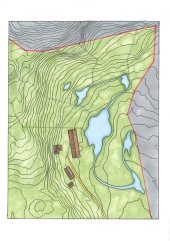Hi Graham,
the only maintenance is pulling out some organic matter in the autumn, usually just dragging some decaying vegetation out with a rake. This removal of organic matter will compensate for the nutrients the pool has collected throughout the year.
The key is to construct the pool so as to minimise the nutrients entering the pool, (for example constructing the edges to prevent surface run-off water entering the pool).
The higher plants (lilies etc.) in the pool will compete for what nutrients are left in the water and deprive algae and duckweeds.
I did some simple heat calculations based on our intermittent summer weather and came to the conclusion that insulating the lower part of the pool was beneficial to keeping the temperature "swimmable" - especially for smaller pools. I usually swim in the pool most days. I have even built a sauna to bring the pool alive in the winter!
This is me breaking the ice and surviving my first winter swim.
Hi I’m David. I am probably the only person to have two Organic Pools (aka Natural Swimming Pools). The reason for this over indulgence was to make a DIY film of the process. Loads of these pools have been made all over the place, helping make the world slightly wetter, pond by pond. I have also made a short film for the BBC about Natural Swimming Pools introducing the concept to a wider audience here in the UK. As a consequence of all of this, I have started giving courses to fellow self-builders who have traveled from far and wide to come and sit in my garden and talk about pools and ponds for two days. What could be nicer?
David Pagan Butler organicpools.co.uk









